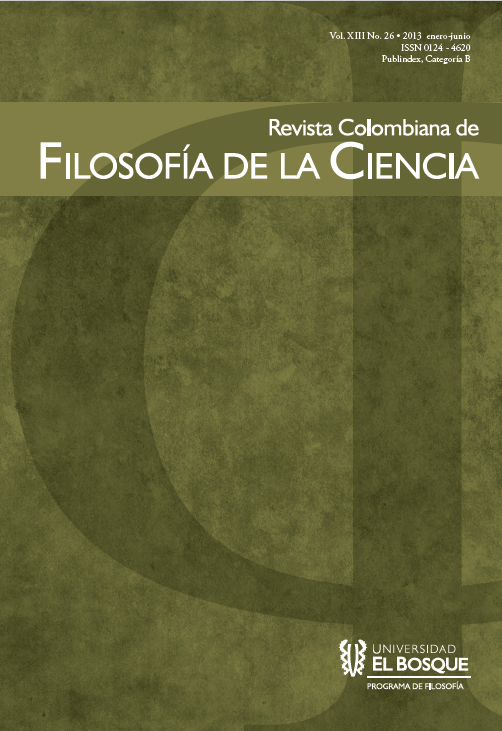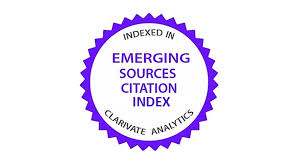El problema de las cl ases naturales en química: consideraciones acerca del esencialismo kripkeano desde la filosofía de la química
DOI:
https://doi.org/10.18270/rcfc.v13i26.1646Abstract
El objetivo del presente trabajo consiste en analizar y cuestionar algunas tesis esencialistas
sobre el problema de las clases naturales, en particular las tesis semánticas y
metafísicas de Saul Kripke, según las cuales existen clases naturales que poseen propiedades
esenciales científicamente descubiertas. Los argumentos se basan en la práctica
científica química y los desarrollos en filosofía de la química. Como aporte positivo al
problema de las clases naturales en química, el trabajo busca defender la viabilidad de
una posición alternativa al esencialismo sin caer en el convencionalismo: un pluralismo
ontológico con raíces kantianas.
Downloads
References
Brigandt, I. & Love, A. “Reductionism in biology”. Ed. E. N. Zalta. The Stanford
Encyclopedia of Philosophy. 2012. En línea. <http://plato.stanford.edu/
archives/sum2012/entries/ reduction-biology/>.
Castagnino, M., Gadella, M. & Lombardi, O. “Time´s arrow and irreversibility
in time-asymmetric quantum mechanics”. International Studies in the
Philosophy of Science 19 (2005): 223-242.
—. “Time-reversal, irreversibility and arrow of time in quantum mechanics”.
Foundations of Physics 36 (2006): 407-426.
Dupré, J. “Natural kinds”. Ed. W. H. Newton-Smith. A Companion to the
Philosophy of Science. Oxford: Blackwell, 1993. 311-319.
Kant, I. Kritik der Reinen Vernunft [KRV]. 1781. Trad. N. Kemp Smith.
Critique of Pure Reason. Nueva York: St. Martin’s Press, 1965.
Kripke, S. “Naming and necessity”. Eds. G. Harman & D. Davidson. Semantics
of Natural Language. Dordrecht: Reidel, 1972. 253-355.
—. Naming and Necessity. Oxford: Blackwell, 1980.
Hendry, R. “Elements, compounds and other chemical kinds”. Philosophy of
Science 73 (2006): 864-875.
Labarca, M. & Lombardi, O. “Why orbitals do not exist?” Foundations of
Chemistry 12 (2010): 149-157.
Laudan, L. “A confutation of convergent realism”. Philosophy of Science 48
(1981): 19-49.
Lewowicz, L. & Lombardi, O. “Stuff versus individuals”. Foundations of
Chemistry 15 (2013): 65-77.
Lombardi, O. “Determinism, internalism and objectivity”. Eds. H. Atmanspacher
& R. Bishop. Between Chance and Choice: Interdisciplinary Perspectives
on Determinism. Thorverton: Imprint-Academic, 2002a. 75-87.
—. “Caos, ergodicidad e internalismo”. Revista Latinoamericana de Filosofía
(2002b): 7-33.
Lombardi, O. & Labarca, M. “The ontological autonomy of the chemical
world”. Foundations of Chemistry 7 (2005): 125-148.
—. “The ontological autonomy of the chemical world: a response to Needham”.
Foundations of Chemistry 8 (2006): 81-92.
Lombardi, O. & Pérez Ransanz. “Lenguaje, ontología y relaciones interteóricas:
en favor de un genuino pluralismo ontológico”. Revista Arbor.
Ciencia, Pensamiento y Cultura 187 (2011): 43-52.
—. Los múltiples mundos de la ciencia. Un realismo pluralista y su aplicación a
la filosofía de la física. México: UNAM-Siglo XXI, 2012.
Needham, P. “What is water?” Analysis 60 (2000): 13-21.
—. “Microessentialism: What is the argument?”. Noûs 45 (2011): 1-21.
Putnam, H. “The meaning of meaning”. Mind, Language and Reality.
Cambridge: Cambridge University Press, 1975. 215-271.
Rohrlich, F. “Pluralistic ontology and theory reduction in the physical
sciences”. The British Journal for the Philosophy of Science 39 (1988): 295-312.
Ruthenberg, K. “What is water? Some philosophical considerations”. Eds. H. P.
Hahn, K. Cless & J. People at the Well: Kinds, Usages and Meanings of Water
in a Global Perspective. Soentgen. Frankfurt: Campus Verlag, 2012. 65-78.
Torretti, R. “Objectivity: a Kantian perspective”. Ed. M. Massimi. Kant and Philosophy
of Science Today. Cambridge: Cambridge University Press, 2008. 81-95.
Van Brakel, J. Philosophy of Chemistry. Between the Manifest and the Scientific
Image. Leuven: Leuven University Press, 2000.
—. “On the inventors of XYZ”. Foundations of Chemistry 7 (2005): 57-84.
—. “Pure chemical substances”. Eds. K. Ruthenberg & J. Van Brakel. Stuff.
The Nature of Chemical Substances. Würzburg: Königshauen & Neumann,
145-162.
Weisberg, M. “Water is not H2O”. Eds. D. Baird, E. Scerri & L. McIntyre.
Philosophy of Chemistry: Synthesis of a New Discipline. New York: Springer,
337-345.
Woolgar, S. Science: The Very Idea. London: Tavistock, 1988.
Downloads
Published
How to Cite
Issue
Section

| Article metrics | |
|---|---|
| Abstract views | |
| Galley vies | |
| PDF Views | |
| HTML views | |
| Other views | |











